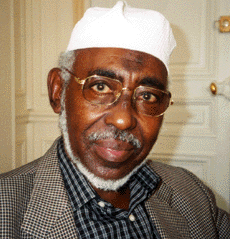Djiboutian parliamentary election, 2003
| | |||||||||||||||||||||||||||||||||||||||||||||||
| |||||||||||||||||||||||||||||||||||||||||||||||
| |||||||||||||||||||||||||||||||||||||||||||||||
| |||||||||||||||||||||||||||||||||||||||||||||||
 |
| This article is part of a series on the politics and government of Djibouti |
|
|
Politics portal |
The 2003 Djiboutian parliamentary election took place in Djibouti on 10 January 2003 to elect the National Assembly of Djibouti. The ruling coalition of President Ismail Omar Guelleh won all 65 seats in the election defeating an opposition coalition.
Background
After being a one party state from 1977 to 1992, limited opposition was allowed in the last two parliamentary elections. The previous parliamentary election in 1997 however still saw supporters of President Guelleh win all of the seats in Parliament. The situation was changed for the 2003 election in that a law under which the number of political parties was restricted to four expired and full multi-party democracy was allowed.[1]
For parliamentary elections Djibouti is divided up into five constituencies, with each constituency having varying number of seats.[2] In each constituency the party or coalition which won the highest vote received all of the seats from that constituency.[2] The 2003 election would also be the first time women would be elected to the Djibouti parliament after a new law was passed requiring a minimum of 10% male or female candidates on each parties candidate list.[3][4]
Campaign
The election was contested between two coalitions.[5] The ruling Union for a Presidential Majority led by Prime Minister Dileita Mohamed Dileita comprised the parties People's Rally for Progress, Front for Restoration of Unity and Democracy, National Democratic Party and the Social Democratic People's Party.[5] They were opposed in the election by an opposition coalition called the Union for a Democratic Change in Government and led by a former Prime Minister Ahmed Dini Ahmed.[5] This coalition comprised the Republican Alliance for Democracy, Movement for Democratic Renewal and Development, Djibouti Party for Development and the Djibouti Union for Democracy and Justice.[5]
Five of the parties in these coalitions were new, having been formed since the law restricting the number of political parties had expired.[1] The opposition alliance was hurt by the decision of Aden Robleh Awaleh and his National Democratic Party to move from the opposition to being a member of the government coalition.[4] Government supporters attacked the opposition leader Ahmed Dini Ahmed for his previous role as a leader of the Front for the Restoration of Unity and Democracy during the Djiboutian Civil War in the early 1990s.[1] The Union for the Presidential Majority called for voters to support them so they could continue to bring economic development to Djibouti and to reduce poverty and unemployment.[3] Meanwhile the opposition criticised the government's record, accusing it of numerous failures and called on voters to bring political change to Djibouti.[1][3]
Election results
The results saw the Union for the Presidential Majority win all of the seats in the Djibouti parliament after topping the vote in all five constituencies.[4] In total they won 62.7% as against 37.3% for the opposition coalition.[4] The opposition came closest to winning seats in the capital Djibouti city where they won just short of 45% of the vote.[4] The election saw 7 women elected to parliament for the first time.[3]
International election monitors generally praised the election saying that "the electoral operations have been free from irregularities".[3] However the opposition denounced the results saying that they were fraudulent and that there had been ballot stuffing, multiple voting and some voting cards had not been distributed.[2] The opposition leader Dini said he would take their case to the constitutional court, but called on his supporters to not launch street protests.[3][4]
| Parties and coalitions | Votes | % | Seats | |
|---|---|---|---|---|
Union for the Presidential Majority (Union pour la Majorité Présidentielle)
|
53,293 | 62.7 | 65 | |
Union for a Democratic Change (Union pour l’Alternance Démocratique)
|
31,660 | 37.3 | 0 | |
| Total (turnout 48.4 %) | 84,953 | 100% | 65 | |
| Sources: Adam Carr/Djibouti Information Agency website, ElectionGuide | ||||
References
- ↑ 1.0 1.1 1.2 1.3 "Djiboutis to vote Friday in Parliamentary polls". Middle East Online. 9 January 2003. Retrieved 2009-05-29.
- ↑ 2.0 2.1 2.2 "Djibouti opposition: official poll results rigged". Middle East Online. 13 January 2003. Retrieved 2009-05-29.
- ↑ 3.0 3.1 3.2 3.3 3.4 3.5 "Djibouti: parliamentary elections Assemblée nationale, 2003". Inter-Parliamentary Union. Retrieved 2009-05-30.
- ↑ 4.0 4.1 4.2 4.3 4.4 4.5 "President's backers win Djibouti poll". BBC Online. 11 January 2003. Retrieved 2009-05-30.
- ↑ 5.0 5.1 5.2 5.3 "Election Profile for Djibouti". ElectionGuide. Retrieved 2009-05-29.
| ||||||||||||||||||

